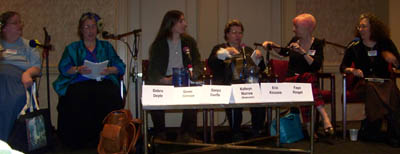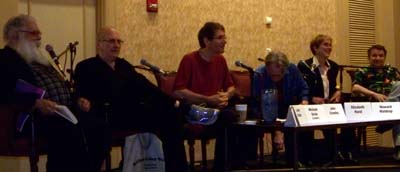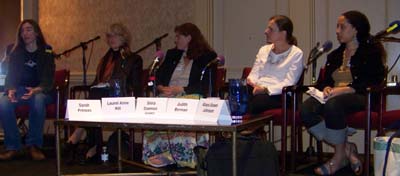Up early again. Hyperion had to be in the Dealer’s Room by 9:30 and I wanted to get to the Green Room for coffee before my 10 o’clock panel. We made it.
10:00 Upbeat Downbeat in YA Fiction. Panelists: Ellen Klages, Gayle Surrette (Moderator), Leah Bobet, Tui Sutherland, Paolo Bacigalupi. Dark and downbeat endings have become fashionable in YA fiction, even to the point where they have been questioned as a fad gone too far. The trend raises a host of questions about the psychology of young readers that need to be asked and answered. Is the tone and resolution of a work of YA fiction actually more important than in adult fiction, e.g., because the readers are still at the age where their worldview is being shaped? Do young readers have a different tolerance for or reaction to downbeat endings than adults? Do they need to be forcibly exposed to the cruel realities of the world, shielded form them, or gently inoculated?
Since I was the moderator for this panel, it’s hard to evaluate how I think it went. I believe it went well and we gave some interesting ideas and feedback to the audience, but then I’m biased. So, if you were there let me know your opinion and what you got out of this panel.
I read several quotes and asked the panelists to give their thoughts in reaction to the quotes.
From Brooklyn Arden (a blog by Cheryl Klein) I got a quote by Richard Peck:
YA novels “end not with happily ever after, but with a new beginning, with the sense of a lot of life yet to be lived”; and the events in the book have left the character better prepared for that.
From the ASJA Monthly, a quote from YA author Nora Baskin:
…YA books today are addressing some of the most controversial and authentic topics in our culture, from eating disorders to drug use, death, suicide, transgender issues, incest: the books reflect the issues that young adults are dealing with in their lives, in more honest and contemporary ways than ever before.
From Cheek by Jowl, a book of essays by Ursula K. Le Guin, in “The Critics, The Monsters, and the Fantasists”
The literature of imagination, even when tragic, is reassuring, not necessarily in the sense of offering nostalgic comfort, but because it offers a world large enough to contain alternatives and therefore hope.
We also discussed Meg Cabot’s June 10th post on her blog where she said:
Why read these books? (trauma porn) If worse than your life they make you feel better. … But if your life is worse what then? What do you read.
Meg read books to escape and now she chooses to write books similar to the ones that offered her escape when she was younger.

"Invention of Fantasy" Panel
1:00 The Invention of Fantasy in the Antiquarian Revival. Panelists: Debra Doyle, Greer Gilman, Sonya Taaffe, Kathryn Morrow (Moderator), Erin Kissane, Faye Ringel. The late nineteenth and early twentieth centuries saw an extraordinary flowering of scholarship on myth, ritual, and cultural traditions form ancient Greece to contemporary Sussex, a mix which had a profound effect on fields as disparate as classical music, analytical psychology, and literature of the Fantastic. Whether the names Jane Ellen Harrison, James George Frazer, or Cecil Sharp mean anything or nothing to teh average reader of fantasy, their legacy includes the mythic vocabulary that underpins much of our field–an older world beneath this one which still seeps through, to be identified in fragments and perilously traced to its source. Join us in exploring the present-day inheritors of these motifs and their framwork, starting with our own Guest of Honor (Greer Gilman’s Cloud derives its physics form The Golden Bough and The White Goddess, its history from Child ballads; Elizabeth Hand’s Mortal Love not only draws on the Victorian folk revival for inspiration, but sets its plot going among the Pre-Raphaelite Brotherhood and the Folk-Lore Society; Hope Mirrlees’ Lud-in-the-Mist is perhaps the archetypal novel of slippage between worlds. Green Men in varying guises haunt the ficiton of all three). Is this a peculiarly English take on fantasy? If so, what are two Americans doing writing it? Or have we all internalized katabasis, solstices, Indo-European trinities? Bring folksongs to answer the questions if you must, but Morris dancing will be politely discouraged.
Greer has about 8,000 variants of Child ballads.Child was interested in the survival of the text but not in the music or the performance. Sharp (sp?) saved the music too and what he could of the performance of the songs.
There was a lot of talk of the strong impulse that seems to insist that a rite or ballad or ritual must be historic and unchanged and the belief that those doing it are following in the footsteps of their ancestors. When, in truth many of these rites/rituals/songs have been transformed or invented or melded with other traditions and none of them can be traced unbroken to the neolithic past.
One point I enjoyed was that nostalgia was really fast. TV today has nostalgia for the 1990s. History begins when you are born and everyone wishes for that “better” past.
There was much discussion of the research of Jane Ellen Harrison and how she was dismissed by her male counterparts but that they then used her research as the basis for their own.

"I Spy" Panel
2:00 I Spy, I Fear, I wonder: Espionage Fiction and the Fantastic. Panelists: Chris Nakashima-Brown, C.C. Finlay (Moderator), Ernest Lilley, James D. Macdonald, Don D’Ammassa. In his afterword to The Atrocity Archives, Charles Stross makes a bold pair of assertions: Len Deighton was a horror writer (because “all cold-war era spy thrillers rely on the existential horror of nuclear annihilation”) while Lovecraft wrote spy thrillers (with their “obsessive collection of secret information”). In fact, Stross argues that the primary difference between the two genres is that the threat of the “uncontrollable universe” in horror fiction “verges on the overwhelming,” while spy fiction “allows us to believe for a while that the little people can, by obtaining secret knowledge, acquire some leverage over” it. This is only one example of the confluences of the espionage novel with the genres of the fantastic: the two are blended in various ways in Neal Stephenson’s Cryptonomicon, Tim Powers’ Declare, William Gibson’s Spook County, and, in the media, the Bond movies and The Prisoner. We’ll survey the best of espionage fiction as it reads to lovers of the fantastic. Are there branches of the fantastic other than horror to which the spy novel has a special affinity or relationships.
Spy novels have a specific atmosphere to them. Usually a person working for a heartless agency and the mission are imposed onto the agent or innocents are pulled in assist.
SF has movement into different space –middle class world to the underworld — while spies seem to go between governments.
Agents are always alien because a spy always is alienated from those around them. Their mission and purpose is imposed and they aren’t themselves. They don’t have true feelings. In SF the character’s feelings are their own.
Spies seldom have personal connections because they aren’t themselves — they play a part and if they have feelings they are based on false premises.
There was a long discussion of sexism because spy novels seem to be an area for men. However, the audience mentioned La Femme Nikita, Alias, and others. But it was considered that the pronoun on most of these female characters could change and no one would notice. There was also the mention of Dorothy Gilman’s Mrs. Polifax novels where the pronoun couldn’t be shifted and still have the book work.
Other books mentioned:
Time Power’s — Declare, Three Days to Never
Dresden Files
The Wolf’s Hour by Robert R. McCammon
The Riddle of the Sands: A Record of Secret Service by Erskine Childers
3:00 Is Darwinism Too Good for SF? Panelists: Steven Popkes, Anil Menon, Jeff Hecht (Leader), Robert J. Sawyer, Caitlin R. Kiernan, James Morrow. This year marks the sesquicentennial of the publication of The Origin of Species and the bicentennial of Charles Darwin’s birth. Considering the importance of the scientific idea, there has been surprisingly little great SF inspired by it. We wonder whether, in fact, the theory has been too good, too unassailable and too full of explanatory power, to leave the wiggle room where speculative minds can play in. After all, physics not only has FTL and time travel, but mechanisms like wormholes that might conceivably make them possible. What are their equivalents in evolutionary theory, if any?
The problem is that with science and physics you can look at the rules and the equations and they work just about anywhere and you know what would happen if you changed any one bit. But for biology we don’t have a handle on things. We’ve only got Earth to see how things work. One sample just isn’t enough. We need another planet to have some comparisons. If we found life on another planet and the DNA matched bits of ours that would tell us a lot. But we don’t, and things aren’t solid.
We’re really still resistant to Darwin’s thesis of Natural Selection because it means we’re not special or fallen angels, we’ve simply evolved along with all the other animals on this planet.
Discussion continued on what would have happened if Darwin hadn’t published. Would Wallace have published? Would the theory just come from one of the other researchers who was working along the same lines.
In our instant world, could you develop a theory based on historical perspective when our current history is only about 17 hours old.
We need to get the supernatural out of the way. Would a Buddhist have similar arguments for/against Natural Selection as Europeans and Americans do? If the theory came from another culture would it be more acceptable?
The panelists seemed to agree that SF and Fantasy tended to play it safe with Darwin’s theory — some books mentioned:
Darwin’s Radio by Greg Bear
Darwinia: A Novel of a Very Different Twentieth Century by Robert Charles Wilson
Bones of the Earth by Michael Swanwick
Teranesia by Greg Egan
Calculating God by Robert J. Sawyer
Frameshift by Robert J. Sawyer
The Dealer’s Room closed at 6 PM and then a group of us went out for Chinese. But, by the time we got back to our room the lack of sleep was catching up to us so we’re going to make it an early night since we start driving home late tomorrow afternoon with a stop in Providence to visit our son. So, we need a bit more shut eye than the six hours we’ve been getting.
 Have you ever sat down to read a new novel and found hours later that it’s after midnight and you need to work tomorrow but what the heck, you need to finish this story? Well, that’s getting lost in a good book. Some people get so wrapped up in the story and the world between the covers of the book that the world in which they live just disappears for a while.
Have you ever sat down to read a new novel and found hours later that it’s after midnight and you need to work tomorrow but what the heck, you need to finish this story? Well, that’s getting lost in a good book. Some people get so wrapped up in the story and the world between the covers of the book that the world in which they live just disappears for a while.








